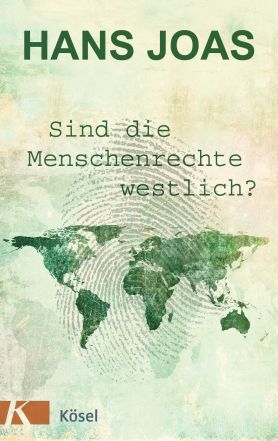Non-fiction
Hans Joas
Sind die Menschenrechte westlich?
[Are Human Rights Western?]
Against Western Self-Congratulation
‘All human beings are born free and equal in dignity and rights.’ This statement, as straightforward as it is powerful, comes from the Universal Declaration of Human Rights of 1948. But of course the actual history of human rights goes back much further, to the Enlightenment in the first instance, with its historic milestones in the late Eighteenth Century. And even at that time human rights had deeper roots leading back to religious ethics, Ancient Greek philosophy and to non-European traditions of thought. In his ‘Are Human Rights Western?’, an essay that is both trenchantly expressed and accessible, Hans Joas focuses, rightly, on the Eighteenth Century and its successors. For sociologists and social philosophers the history of human rights in the modern world is closely bound up with the history of torture and slavery – and with the process Joas refers to as the ‘sacralisation of the individual’. He describes this sacralisation of the individual as a historical change in the course of which ‘every single human being is understood incrementally… to be sacred’, whereby the sacred is thought of as not just religious but as including secular values as well. As in his earlier, comprehensive study of 2011, The Sacredness of the Person: A New Genealogy of Human Rights, Joas points out that the emergence of human rights is a cultural process, as well as a legal one, and that it did not always develop in a unified way. He also responds to criticisms and arrives at the conclusion that the first signs of the sacredness of the individual can be found as early as the Axial Age (800-200 BC), as well as in India or China.
The particular strength of this 80-page essay, however, lies in Joas’s concentration on torture and slavery, which emerge as the systematically repressed shadow-sides of the history of human rights. ‘Not one of the much-lauded cultural sources allegedly enshrining European values provided the foundations for a single-minded resistance to slavery,’ Joas argues. From Plato and the Bible down to Hobbes and Locke, slavery is accepted and justified. Paradoxically, the slave trade flourished at the same time as freedom and property rights were asserting themselves. We might sum it up by saying that the more Europeans and Americans discovered the merits of liberty, the more eager they became to seek profit by investing in slavery in the plantations on the margins of their empires.
Christians were an integral part of this process. In North America, for example, the ‘Protestant emphasis on freedom’ went hand in hand with the ‘juridical rationalisation of slavery’. The ceremony of baptism did not guarantee any right to emancipation. Even worse, there were preachers who ‘spoke out against any possible gentleness or laxity on the part of the slave owners’. No religious or secular tradition came out consistently in opposition to slavery, according to Joas. Admittedly, every religion and every philosophy contained the potential for the sacralisation of the individual – and with it for a moral universalism, a mode of thought that conferred the same rights on all mankind. But this potential was regularly ignored. In Joas’s summing-up, ‘Instead of indulging in the retrospective glorification of our tradition, we must cultivate a precise understanding of the ways in which we might mobilize a potential that has often been so ineffectual.’ Joas points emphatically to the blind spots in the West’s view of itself – and to the Janus-like doublethink that would confer human rights on only a very few.
In addition to slavery, Joas’s gaze focuses on torture. Although it was officially abolished during the Eighteenth Century, torture persisted in the colonies for many years. ‘The historical achievements of liberty and the law in Europe were effectively denied to the populations of the European colonies.’ Torture became the highest and most brutal form of colonial power.’ Crucially, it was applied systematically, as Joas observes in the context of French policy in Algeria. Whereas in Europe after the Second World War the West campaigned grandiloquently for democracy and human rights, it took the opposite route in the colonies. ‘Hypocrisy’ might be the more emotional term to characterise Europe’s understanding of itself. Joas’s own tone, however, never strays from the sober and precise. His essay has all the greater impact because he refrains from polemics.
In his conclusion, Joas returns to a discussion of the ‘universal Declaration’ of 1948 – and to the fact that this text is thought of the fruit of ‘Western intellectual traditions’. Joas points instead to the role of the non-European members of the Commission and in general the group of philosophers working on the theoretical foundations of human rights emphasized the diversity of the cultural traditions involved. There could be no question, in Joas’s view, of a ‘Western takeover’. We need to learn from the history of our use of force, he concludes, and overcome our tendency to make grand gestures inspired by our sense of our own superiority. He notes critically that the tone of our talk about European values frequently takes our ‘confident possession’ of such values for granted. His slender volume issues a challenge that strikes at the heart of our European assumptions: we need self-criticism, not triumphalism.
Translated by Rodney Livingstone
By Jutta Person
Jutta Person, born 1971 in South Baden, studied German, Italian and Philosophy in Cologne and Italy, and gained a doctorate with a dissertation on the history of physiognomy in the 19th century. A journalist and cultural commentator, she is based in Berlin and writes for the Süddeutsche Zeitung, Die Zeit and Philosophie Magazin. From 2004 to 2007 she was an editor at Literaturen; since 2011 she has been in charge of the books section at Philosophie Magazin.
(Updated: 2020)


